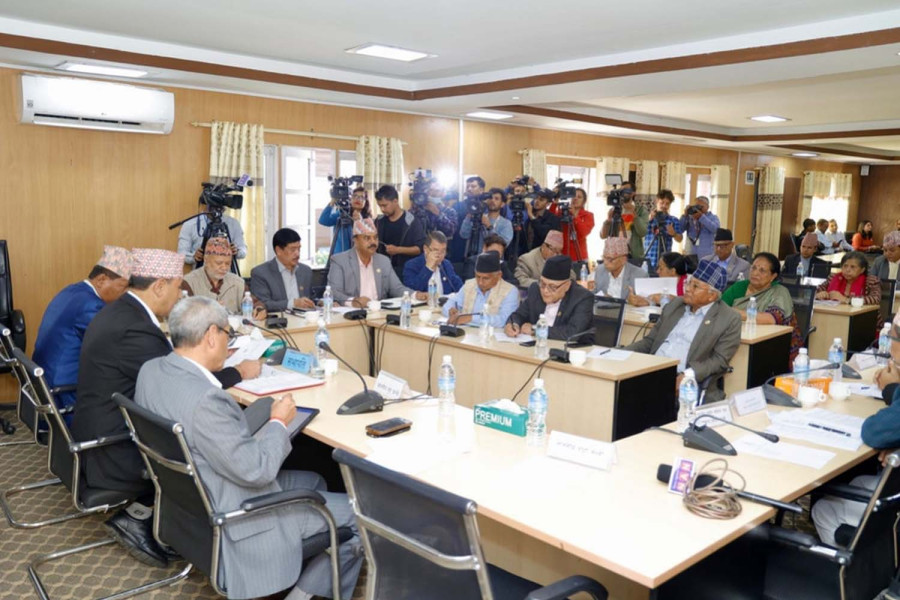Politics
Parties race to finalise pending bills ahead of new House session
A key bill is on giving CIAA access to phone and electronic communication, another on splitting civil aviation body.
Binod Ghimire
The ruling parties have decided to expedite pending bills in various parliamentary committees to ensure that they land in parliament before the start of the winter session.
A meeting of the taskforce formed to facilitate the lawmaking process on Thursday decided to assign one lawmaker each from the Nepali Congress and the CPN-UML in seven different parliamentary committees as focal persons to facilitate the endorsement of the bills. The focal persons’ role will be to develop consensus first within their parties and then with other parties.
After building consensus within the two big parties, the focal persons will hold discussions with the opposition parties to secure the passage of the bills unanimously. Currently, 18 bills are stuck in different parliamentary committees—14 under the House of Representatives and four under the National Assembly.
Among these bills, five are under consideration in the Finance Committee, three under the State Affairs and Good Governance Committee and two each in the Education, Health and Information Technology Committee, and the Infrastructure Development Committee.
“We aim to have the House committees endorse at least half of the pending bills before the winter session starts,” said Mahesh Bartaula, the UML chief whip and a member of the taskforce. “One bill was endorsed today [Thursday]. The number will increase in the coming days.”
After deliberations for over a year, the State Affairs Committee unanimously endorsed the bill to amend the Corruption Prevention Act with provisions to empower the Commission for Investigation of Abuse of Authority (CIAA), the constitutional anti-graft agency. If endorsed by the federal parliament, the CIAA will gain access to telephone and other communications details done through electronic mediums. It, however, needs a court permission. Similarly, it can also carry out undercover operations.
The bill has also removed the statute of limitations for investigating corruption cases. The bill registered by the KP Sharma Oli government in 2019 was endorsed by the National Assembly in April last year with a provision that a corruption case must be prosecuted within five years from the date of knowing that such an act has been committed. Following controversy, the government agreed to remove the provision in the House committee.
Shyam Ghimire, the Congress chief whip and a member of the taskforce, said the bill to amend some Nepal Acts is expected to be approved by the Law, Justice and Human Rights Committee after a few sittings.
If Bartaula is to be believed, the government is waiting for the federal parliament to have adequate business before calling the winter session. “The winter session will be called latest by Magh first week [January third week],” he said.
The government is also preparing to register a few new bills including those related to splitting the Civil Aviation Authority of Nepal, integrated election laws, and amendments to the Nepal Police Act. Last week, the Oli government registered a bill to facilitate ship operations.
The Cabinet must endorse the bills drafted by various ministries before they can be registered in Parliament. Such bills are first discussed in the full House and then sent to the respective committees to streamline the amendments. They must get through both chambers and receive the presidential seal before becoming a law.
The President summons and prorogues Parliament on the government’s recommendation. There cannot be a gap of more than six months between two sessions. The previous [budget] session ended on September 16.
Several bills for a full-fledged implementation of the new constitution are yet to be passed. A subpanel under the Legislation Management Committee of the National Assembly reported that the government still needs to draft 39 more bills.
The five-member subpanel led by Beduram Bhusal has accused successive governments of paying little attention to making legal arrangements for the charter’s full implementation. Seven governments led by the Nepali Congress, the CPN-UML and the CPN (Maoist Centre) have been formed since the promulgation of the constitution in 2015.




 13.12°C Kathmandu
13.12°C Kathmandu














